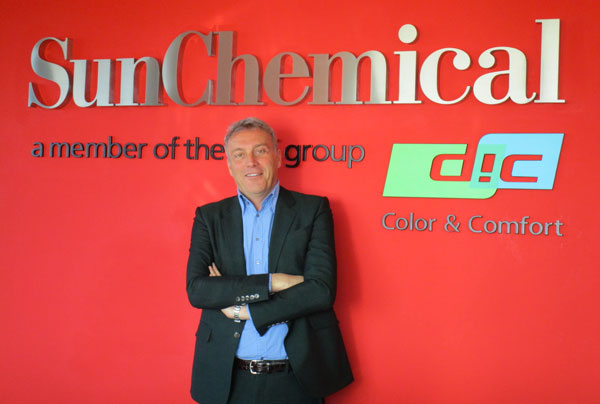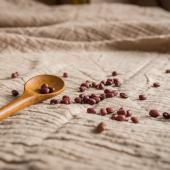Sufficit animus*
Printing inks and the like.
Courage is all you need… Perhaps it wasn’t even true in the times of Gabriele D’Annunzio, but you certainly need a lot more than that in a globalised and competitive market like today’s that continues to be evermore demanding. As a precautionary measure, one had better add methods of control and improvement of the industrial processes as well as reduction of waste, like Lean Six Sigma. This seems to be the “abundant” way followed by Fabio Deflorian, head of Sun Chemical Group Italy. And the results are seen to be forthcoming.
| * According to the motto of the “The First Torpedo Plane Naval Squadron” (S.A.) for which, in 1918, Adolfo De Carolis designed a ship’s prow borne up by eagle’s wings. The initial S.A. helped Gabriele D’Annunzio spawn the idea of the motto “Sufficit animus”, or that is “Courage is all you need”. |
Italy, what riches you contain! What great wealth of entrepreneurial “biodiversity” our country presents: often “ship without steersman in a great storm”, but also a place where true people, giving their best, know how to accept the differences, acknowledge determination and encourage action.
I find confirmation of this meeting up once more with Fabio Deflorian, AD of Sun Chemical Italia, determined company man to the core, who though shows clear traces of true entrepreneurship, capable of systematically questioning the present, taking on the risks that come with the job, while one top of that showing himself totally capable - by inclination and by character - of savouring emotions without any hint of suspicion.
This may also be due to the positive results, that confirm the choices he has made, but I never cease to be surprised by this man, by his spontaneous strength of concentration, the way he self-ironically lives with his doubts, his instinctive drive towards constant renewal.
That is to say, in all these years we have known each other, each time I continue to strongly recognize in Deflorian that faith in his own work that wards off need, and his courage, that enables him to overcome the difficulties that might beset him.
And all that has been written here is in his words...

2016: growth aboveall in inks for newspapers and converting
By any standards 2016 was not an easy year due to the poor performance of the Italian economy. For Sun Chemical (DIC group) the last financial year closed with a significant increase in profits.
«As far as sales are concerned, we have increased market shares in inks for printing newspapers, despite the negative growth of the publishing sector, and we are still recording two digit growth for sheet offset inks for digital printing, due to the policies we started implementing five years back, that sees us evermore present in the converting sector, while we have consolidated our shares in the commercial printing sector.
Sales of inks for flexible packaging, for paper and corrugated board are seen to be stable.
Indeed, by now, the sole possibility for growth is to increase market shares: we have taken advantage of a situation favorable to use, rewarding in terms of product quality and services, also thanks to consolidated interpersonal relations with the market.
For example, as far as newspapers are concerned, we are now the only brand that continues to produce black inks in Italy and that has a significant stock of “coloreds” which, if need be, allows us, in terms of logistics, to guarantee deliveries just in time!».
2017: scarcity of raw materials and increase in prices
The indicators regarding the year at hand show sales trends that corroborate what has actually been happening. Sun Chemical estimates a further growth in both the converting (sheet offset) as well as in the newspapers’ sector, inasmuch as important deals have been closed with the the main newspapers.
As far as flexible packaging and corrugated board, is concerned, the multinational has a market share above 50%, hence quite considerable, which means sizeable increases are not envisaged, aboveall in a time in which, at the beginning of March, Sun Chemical has decided to up its product prices.
«After a long period of stagnation, already in the second part of 2016, the prices of some raw materials began to increase, a trend that was reinforced in the opening months of this year.
Titanium bioxide continues to constitute the main problem, this being the pigment that is used for producing all white inks, both water as well as solvent based. As well as the increases that have already been registered, at the end of January a sizeable fire broke out in the Finnish site of Huntsman Tioxide, that is one of the two main world producers of this product.
The event created a clear and quite worrying shortage, which compelled us to introduce, at the beginning of March, a two digit price increase on all white inks. There are other raw materials that are also in the meantime undergoing price increases and some are now becoming scarce: this is the case of the diphenylmethane diisocyanate (MDI), used in the formulation of some solvent based bicomponent varnishes and inks. However, acrylic resins also in aqueous solutions for producing waterbased inks, should also undergo sizeable increases, due to the fact that there has been a sharp rise in methyl methacrylate price quotations at source, which constitutes the basic raw material».
 Water sustainability
Water sustainability
The crisis of these years has led the people to be more astute in managing their purchases and to waste less; against that the number of singles has increased, hence leading to a greater portioning of products. The demands of the FMCG market, first and foremost food, are evermore complex, and thrust things in the direction of new technological solutions.
«Recently we have devised two series of waterbased inks for flexo printing on plastic film.
One called Aquatene for external printing on polyethylene film, also transparent, or on polythene coated board, with resistance to grease, water and a whole series of chemical agents. The other, Aqualam, is in turn a series for the internal printing of film for lamination. These inks, already used at industrial level, are also in use on traditional solvent based machines at printing speeds of over 250 metres/minute.
I am speaking of sizeable volumes, of hundreds of tons, that we have been supplying for two years now to some converting companies that choose to invest in production equipment and facilities rather than in a system with post catalyctic burner.
I have to say, as to the “difficulty” of printing using waterbased inks on plastic film, I have had to change my mind: we have managed to find a specific application, that at any rate accounts for a significant share of the market. We produce these inks in our Caleppio works and, for now, they are only sold in Italy, but they could enjoy success in other countries where concentration on environmental issues is paramount».
At interpack, inks, adhesives and..
Printing inks affect the end cost of flexible packaging at a percentage that varies depending on the substrates used. This ratio is high when printing on thin monofilm, for example overpackaging, and less so when high performance multilaminates are being processed, in which case adhesives and the laminating process also count.
«In order to offer converters and brand owners solutions capable of reducing the weight and hence the cost of packaging, Sun Chemical, thanks to the experience of the group leader DIC, for example proposes laminating adhesives that enable a downgauging of film thickness, and in some cases, also a reduction in the number of layers.
This is an important aspect and will be the leitmotif or our stand at interpack: a fair where Sun Chemical has always taken part, but that this year constitutes our key engagement. More exhibition space, a full presence of functionaries and technicians, with a strong focusing on the end users, all this in view of further reinforcing the cooperation between all the actors in the supply chain as regards sustainability and food waste (see shoulder article Ed.)
Not all types, but all kinds
Up to yesterday it was one thing producing inks, another producing adhesives. As though often happens, one heads towards an integration of the offer in order to effectively satisfy the needs of the customer, with the objective of proposing one’s services as a “privileged” supplier.
«Sun Chemical has been part of the DIC group for some time now, and among other things produces a vast range of adhesives for waterbased and solventless lamination. Hence, we had the products and what we have done, over these last years, has been to organize ourselves at a local and European level, in terms of logistics services and technical support: in Italy this function has been entrusted to a product manager with many years’ experience in the field. For the customers the advantage of having a sole supplier - capable of solving any problems of ink/adhesive “compatibility”, is clear both commercially and technically.
This for us this means taking on further responsibility and greater risk, but we have fully decided on this course of action.
Thanks to DIC’s knowhow, we are competitive in the specialties field and in the field of high-end technical adhesives, while as far as standard products are concerned, there are many producers, also at national level, with excellent manufacturing structures, capable of offering both quality and price».
Improve what is already done well
Reports show that Sun Chemical is surely well structured to preside over the markets in commercial terms as well as in terms of technical assistance and maintenance, but despite this position of strength, things have been done with the end in mind of “requalifying” both organization and production.
«The Caleppio 1 and Caleppio 2 facilities, subsequent to considerable economic effort, now fully comply with GMP standards, which for example means that sheet offset ink production lines destined respectively for the commercial and the converting sectors have been segregated. This also because we are firmly convinced of the need for continuous improvement.
It was back in 2004 when we first began applying the Six Sigma methodology, to go on to integrate the same with the principles of ‘lean production’: at the outset, I must confess, I was skeptical, but I must recognize that we drew evident and measurable benefits also in economic terms. Now, when we want to achieve improvements, such as increase in productivity of safety on the workplace, we study Lean Six Sigma, aware of the fact that one should never push things to extremes and should always carefully ponder in terms of what one should best do or not do. Which means never reneging on making sensible choices when one goes from theory to practice».
RELATED ARTICLES: "Sun Chemical at interpack 2017"

















